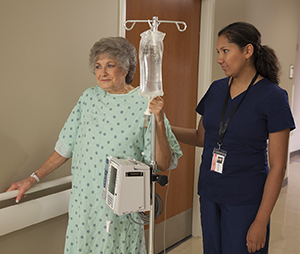A
B
C
D
E
F
G
H
I
J
K
L
M
N
O
P
Q
R
S
T
U
V
W
X
Y
Z
Topic IndexLibrary Index
Click a letter to see a list of conditions beginning with that letter.
Click 'Topic Index' to return to the index for the current topic.
Click 'Library Index' to return to the listing of all topics.
After Peripheral Artery Bypass Surgery: In the Hospital
After peripheral artery bypass surgery, plan on being in the hospital for about 3 to 8 days. The length of your stay depends on the type of bypass you have, your health, and your response to surgery. You can expect to have pain in your incision (cut) and discomfort after the surgery for several days to a week. You may also have swelling and draining at the surgery site.
Right after surgery
Your healthcare providers will watch you closely in the recovery room. From there, you may go to an intensive care unit (ICU), if needed. Once you're stable, your healthcare provider will move you to a regular hospital room. Your leg may swell and be painful. But your provider will give you medicine to control pain and prevent infection.
As you regain strength
You will be encouraged to start walking soon. Wear slippers or shoes to protect your feet. Raise (elevate) your leg whenever you're sitting. Tell a nurse right away if you have chest pain, foot pain, or shortness of breath. Also let your surgeon know if your incision becomes swollen or is draining, or if you have constipation. Nurses will come by often to check the pulses in your leg and check the incision site. Let them know if you feel coolness or numbness in your leg or foot. Before going home, your healthcare provider may teach you to take your pulse in your leg.

Why walk?
Walking is a big part of your early recovery. Walking reduces swelling and helps your incision heal. Walking also helps prevent lung problems, such as pneumonia. It also reduces your risk of developing blood clots in the veins of your legs. The sooner you recover in the hospital, the sooner you can go home.
Online Medical Reviewer:
Chris Southard RN
Online Medical Reviewer:
Marianne Fraser MSN RN
Online Medical Reviewer:
Melinda Murray Ratini DO
Date Last Reviewed:
3/1/2024
© 2000-2024 The StayWell Company, LLC. All rights reserved. This information is not intended as a substitute for professional medical care. Always follow your healthcare professional's instructions.